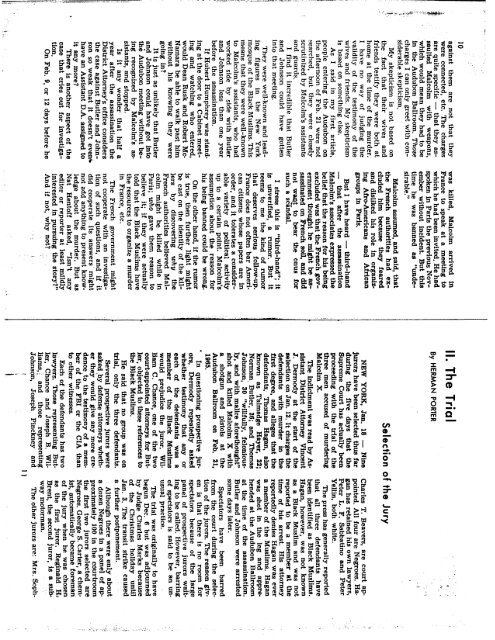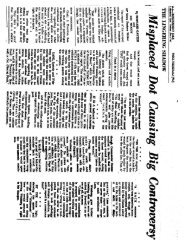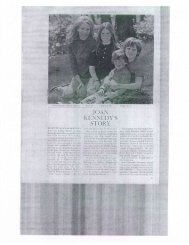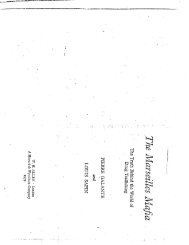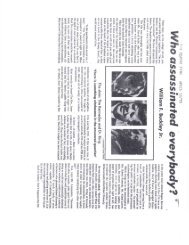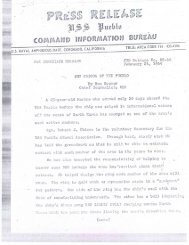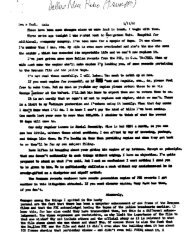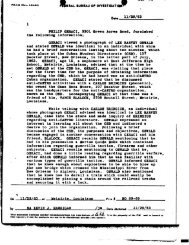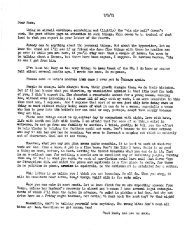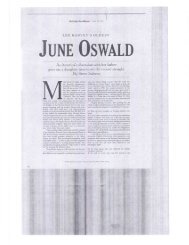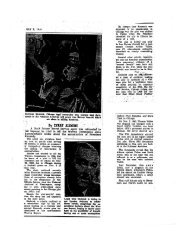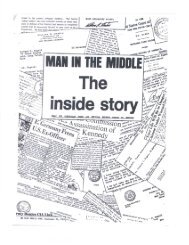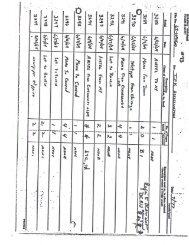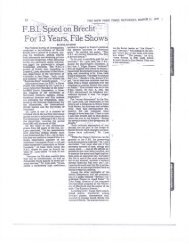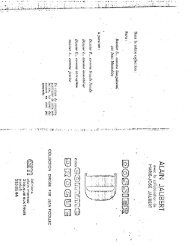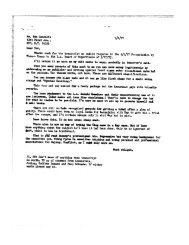THE ASSASSINATION OF MALCOLM X
THE ASSASSINATION OF MALCOLM X
THE ASSASSINATION OF MALCOLM X
Create successful ePaper yourself
Turn your PDF publications into a flip-book with our unique Google optimized e-Paper software.
NEW YORK, Jan. 18 — Nine<br />
jurors have been selected thus far<br />
during the five days that the<br />
Supreme Court has actually been<br />
proceeding with the trial of the<br />
three men accused of murdering<br />
Malcolm X.<br />
The indictment was read by Assistant<br />
District Attorney Vincent<br />
J. Dermody at the start of the<br />
selection on Jan. 12. It charges the<br />
defendants with murder in the<br />
first degree, and alleges that the<br />
defendants, Thomas Hagan, also<br />
known as Talmadge Hayer, 22;<br />
Norman Butler, 26; and Thomas<br />
Johnson, 30 "willfully, feloniously,<br />
and with malice aforethought"<br />
shot and killed Malcolm X with<br />
a shotgun and pistols at the<br />
Audubon Ballroom on Feb. 21,<br />
1965.<br />
' In questioning prospective jurors,<br />
Dermody repeatedly asked<br />
whether testimony that any or<br />
each of the defendants was a<br />
member of the Black Muslims<br />
would prejudice the juror. William<br />
C. Chance, one of the two<br />
court-appointed attorneys for Butler,<br />
objected to these references to<br />
the Black Muslims.<br />
He said that no group was on<br />
trial, only the three defendants.<br />
Several prospective jurors were<br />
asked by defense attorneys whether<br />
they would give any more credence<br />
to the testimony of a member<br />
of the FBI or the CIA than<br />
to other witnesses.<br />
Each of the defendants has two<br />
lawyers. Those representing Butler,<br />
Chance and Joseph B. Williams,<br />
, and those representing<br />
Johnson, Joseph Pinckney and<br />
Charles T. Beavers, are court appointed.<br />
All four are Negroes. Hagan<br />
has retained his own lawyers,<br />
Peter L. F. Sabbatino and Peter<br />
Yellin, both white.<br />
The press has generally reported<br />
that all three defendants have<br />
been identified as Black Muslims.<br />
Hagan, however, was not known<br />
as a Black Muslim and was not<br />
reported to be a member at the<br />
time of his arrest. His attorney<br />
reportedly denies Hagan was ever<br />
a member of the Muslims. Hagan<br />
was shot in the leg and apprehended<br />
at the Audubon Ballroom<br />
at the time of the assassination.<br />
Butler and Johnson were arrested<br />
some days later.<br />
Spectators have been barred<br />
from the court during the selection<br />
of the jurors. The reason given<br />
is that there is no room for<br />
spectators because of the large<br />
panel of prospective jurors waiting<br />
to be called. However, barring<br />
of spectators is said to be an unusual<br />
practice.<br />
The trial was originally to have<br />
begun Dec. 6 but was adjourned<br />
by Judge Charles Marks because<br />
of the Christmas holiday until<br />
Jan. 3. The transit strike caused<br />
a further postponement.<br />
Although there were only about<br />
a dozen Negroes in a panel of approximately<br />
100 in the courtroom<br />
the first two jurors selected are<br />
Negroes. George S. Carter, a chemist,<br />
automatically became foreman<br />
of the jury when he was chosen<br />
as the first juror. Reginald IL<br />
Brent, the second juror, is a subway<br />
motorman.<br />
The other jurors are: Mrs. Soph-<br />
10<br />
against them are not that they<br />
were connected, etc. The charges<br />
are quite specific — that they assaulted<br />
Malcolm with weapons,<br />
which would mean they had to be<br />
in the Audubon Ballroom. Those<br />
charges I can only greet with considerable<br />
skepticism.<br />
My skepticism is not based on<br />
the fact that their wives and<br />
friends testify they were both at<br />
home at the time of the murder.<br />
I have no way of judging the<br />
validity of the testimony of the<br />
wives and friends. My skepticism<br />
is based on something else.<br />
As I said in my first article,<br />
people entering the Audubon on<br />
the afternoon of Feb. 21 were not<br />
searched, but they were closely<br />
scrutinized by Malcolm's assistants<br />
and guards.<br />
I find it incredible that Butler<br />
and Johnson could have gotten<br />
into that meeting.<br />
They were well-known and leading<br />
figures in the New York<br />
mosque of the Black Muslims. This<br />
means that they were well-known<br />
to Malcolm's assistants, who had<br />
worked side by side with Butler<br />
and Johnson less than one year<br />
before the assassination.<br />
If Hubert Humphrey was standing<br />
at the door to a Cabinet meeting<br />
and watching who entered,<br />
would Dean Rusk and Robert Mc-<br />
Namara be able to walk past him<br />
without his knowing they were<br />
going in?<br />
It is just as unlikely that Butler<br />
and Johnson could have got into<br />
the Audubon meeting without being<br />
recognized by Malcolm's assistants,<br />
and stopped.<br />
Is it any wonder that half a<br />
year after the assassination the<br />
District Attorney's office considers<br />
the case against Butler and Johnson<br />
so weak that it doesn't evens<br />
have an Assistant D.A. assigned to<br />
it any more?<br />
There is another aspect of the<br />
case that cries out for investigation.<br />
On Feb. 9, or 12 days before he<br />
was killed, Malcolm arrived in<br />
France to speak at a meeting to<br />
which he had been invited. He had<br />
spoken in Paris the previous November<br />
without incident. But this<br />
time he was banned as "undesirable."<br />
Malcolm assumed, and said, that<br />
the French authorities had excluded<br />
him because they feared<br />
and disliked his role in organizing<br />
Afro-Americans and African<br />
groups in Paris.<br />
But I have heard — third-hand<br />
— that after the assassination<br />
Malcolm's associates expressed the<br />
belief that the reason for his being<br />
excluded was that the French government<br />
thought he might be assassinated<br />
on French soil, and did<br />
not want to bear the onus for<br />
such a scandal.<br />
I stress this is "third-hand"; it<br />
is unverified, a rumor. But it<br />
seems to me the kind of rumor<br />
that deserves serious follow-up.<br />
France does not often bar American<br />
citizens whose papers are in<br />
order, and it tolerates a considerable<br />
variety of political activity<br />
up to a certain point. Malcolm's<br />
assumption about the reason for<br />
his being banned could be wrong.<br />
On the other hand, if the rumor<br />
is true, then further light might<br />
be cast on the identity of the killers<br />
by discovering why the<br />
French authorities believed Malcolm<br />
might be killed while in<br />
Paris; who gave them reason to<br />
believe it; if they were actually<br />
told that the Black Muslims have<br />
the resources to organize a murder<br />
in France, etc.<br />
The French government might<br />
not cooperate with an investigation<br />
of such questions, and if it<br />
did cooperate its answers might<br />
not add anything to present knowledge<br />
about the murder. But as<br />
Nat Hentoff asked, "Isn't any<br />
editor or reporter at least mildly<br />
interested in pursuing the story?"<br />
And if not, why not?<br />
Selection of the Jury<br />
By HERMAN PORTER<br />
II. The Trial


